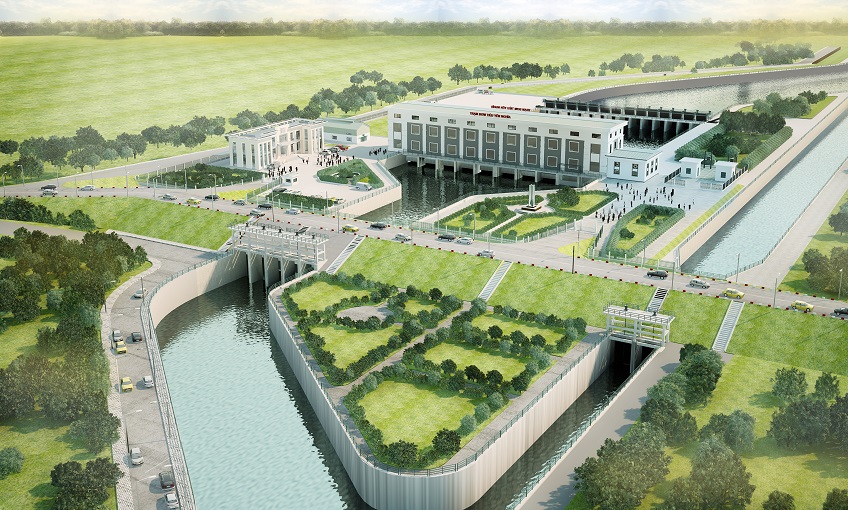
Fatal flooding in Vietnam following heavy rainfall, led to numerous flood control projects being initiated. The Yen Nghia project in the vicinity of Hanoi, the capital of Vietnam, called for ANDRITZ to supply 10 vertical line shaft pumps.
Vietnam is one of the rainiest countries in the world. The majority of the rainfall is in the North of the southeast Asian coastal state. Although this area is actually characterized by a sub-tropical climate alternating between hot and humid summers and mild winters, on average it is the humid weather that dominates for eight months of the year.
The peak of this phase is reached during the three-month rainy season in late summer and fall. In this period, the incoming monsoon causes heavy storms every year. In particular, heavy and steady rain caused rivers and streams to burst their banks, thus leading to flooding.
Loss of life In 2008, more than 100 people lost their lives due to floods in Vietnam. The capital city Hanoi, where 20 people were killed in the floods or by lightning, was particularly hard hit. In addition to these fatalities, the storms led to a shortage of clean drinking water and basic foods. After heavy rainfalls in 2013, more than 30 people died and more than 100,000 houses were flooded. In the period from October to November 2016, Vietnam was plagued by a total of three unusually violent storms. Floods again killed around 40 people and destroyed 100,000 houses as well as 1300 hectares of rice fields.
In order to contain the severe effects of the annual period of rain and heavy storms, the Vietnamese ministry of agriculture and rural development launched numerous flood control projects. The Yen Nghia project marks the beginning of this initiative. Up to the end of 2018, the biggest flood discharge pumping station in the country will be built to the southwest of the capital Hanoi, with about 6.4 million inhabitants. Andritz is supplying 10 vertical line shaft pumps in the intended period from March to August 2018.
Specially designed The Yen Nghia pumping station and the associated pumps are specially designed and built for the flood control application. This means that the pumps are only activated in case of need, but then have to work 100%. Their task is to transport large amounts of water at low head in the shortest possible time. Therefore, each pump has an axial hydraulic and extremely robust design in order to successfully defy diverse materials washed away by floods.
Each pump conveys up to 15 m³ cubic meters of water per second. If all ten pumps are activated, they can together transport up to 150 m³ per second. Thus, they would be able to empty the world’s largest swimming pool (250 million liters) in the Chilean resort of San Alfonso del Mar in less than half an hour.
The scope of supply includes the construction, manufacture, transport, and installation supervision of the ten pumps in Vietnam as well as ANDRITZ original spare parts. The required performance test of the pumps will be conducted at the test bench of the local Vietnamese company Hai Duong Pump Manufacturing JSC – or HPMC for short.
HPMC is responsible for supply of the entire electromechanical equipment for the Yen Nghia station. In the course of the collaboration on the largest pumping station in Vietnam, ANDRITZ has signed an exclusive distribution contract for large pumps with HPMC for Vietnam, Cambodia, and Laos. This forms the basis for receipt of further common projects in the future.




